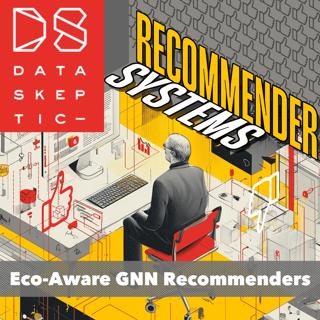![[MINI] The Bonferroni Correction](https://cdn.podme.com/podcast-images/5F4A09818CBDD79A464B9CC4E8C8B625_small.jpg)
[MINI] The Bonferroni Correction
Today's episode begins by asking how many left handed employees we should expect to be at a company before anyone should claim left handedness discrimination. If not lefties, let's consider eye color, hair color, favorite ska band, most recent grocery store used, and any number of characteristics could be studied to look for deviations from the norm in a company. When multiple comparisons are to be made simultaneous, one must account for this, and a common method for doing so is with the Bonferroni Correction. It is not, however, a sure fire procedure, and this episode wraps up with a bit of skepticism about it.
22 Jan 201614min

Detecting Pseudo-profound BS
A recent paper in the journal of Judgment and Decision Making titled On the reception and detection of pseudo-profound bullshit explores empirical questions around a reader's ability to detect statements which may sound profound but are actually a collection of buzzwords that fail to contain adequate meaning or truth. These statements are definitively different from lies and nonesense, as we discuss in the episode. This paper proposes the Bullshit Receptivity scale (BSR) and empirically demonstrates that it correlates with existing metrics like the Cognitive Reflection Test, building confidence that this can be a useful, repeatable, empirical measure of a person's ability to detect pseudo-profound statements as being different from genuinely profound statements. Additionally, the correlative results provide some insight into possible root causes for why individuals might find great profundity in these statements based on other beliefs or cognitive measures. The paper's lead author Gordon Pennycook joins me to discuss this study's results. If you'd like some examples of pseudo-profound bullshit, you can randomly generate some based on Deepak Chopra's twitter feed. To read other work from Gordon, check out his Google Scholar page and find him on twitter via @GordonPennycook. And just for fun, if you think you've dreamed up a Data Skeptic related pseudo-profound bullshit statement, tweet it with hashtag #pseudoprofound. If I see an especially clever or humorous one, I might want to send you a free Data Skeptic sticker.
15 Jan 201637min
![[MINI] Gradient Descent](https://cdn.podme.com/podcast-images/6FBB75C040AB113A0825C3E1C4F6F2B9_small.jpg)
[MINI] Gradient Descent
Today's mini episode discusses the widely known optimization algorithm gradient descent in the context of hiking in a foggy hillside.
8 Jan 201614min

Let's Kill the Word Cloud
This episode is a discussion of data visualization and a proposed New Year's resolution for Data Skeptic listeners. Let's kill the word cloud.
1 Jan 201615min

2015 Holiday Special
Today's episode is a reading of Isaac Asimov's The Machine that Won the War. I can't think of a story that's more appropriate for Data Skeptic.
25 Des 201514min

Wikipedia Revision Scoring as a Service
In this interview with Aaron Halfaker of the Wikimedia Foundation, we discuss his research and career related to the study of Wikipedia. In his paper The Rise and Decline of an open Collaboration Community, he highlights a trend in the declining rate of active editors on Wikipedia which began in 2007. I asked Aaron about a variety of possible hypotheses for the phenomenon, in particular, how automated quality control tools that revert edits automatically could play a role. This lead Aaron and his collaborators to develop Snuggle, an optimized interface to help Wikipedians better welcome new comers to the community. We discuss the details of these topics as well as ORES, which provides revision scoring as a service to any software developer that wants to consume the output of their machine learning based scoring. You can find Aaron on Twitter as @halfak.
18 Des 201542min
![[MINI] Term Frequency - Inverse Document Frequency](https://cdn.podme.com/podcast-images/EF3DE30D3595D46D4E3E142B6C2DCB0F_small.jpg)
[MINI] Term Frequency - Inverse Document Frequency
Today's topic is term frequency inverse document frequency, which is a statistic for estimating the importance of words and phrases in a set of documents.
11 Des 201510min

The Hunt for Vulcan
Early astronomers could see several of the planets with the naked eye. The invention of the telescope allowed for further understanding of our solar system. The work of Isaac Newton allowed later scientists to accurately predict Neptune, which was later observationally confirmed exactly where predicted. It seemed only natural that a similar unknown body might explain anomalies in the orbit of Mercury, and thus began the search for the hypothesized planet Vulcan. Thomas Levenson's book "The Hunt for Vulcan" is a narrative of the key scientific minds involved in the search and eventual refutation of an unobserved planet between Mercury and the sun. Thomas joins me in this episode to discuss his book and the fascinating story of the quest to find this planet. During the discussion, we mention one of the contributions made by Urbain-Jean-Joseph Le Verrier which involved some complex calculations which enabled him to predict where to find the planet that would eventually be called Neptune. The calculus behind this work is difficult, and some of that work is demonstrated in a Jupyter notebook I recently discovered from Paulo Marques titled The-Body Problem. Thomas Levenson is a professor at MIT and head of its science writing program. He is the author of several books, including Einstein in Berlin and Newton and the Counterfeiter: The Unknown Detective Career of the World’s Greatest Scientist. He has also made ten feature-length documentaries (including a two-hour Nova program on Einstein) for which he has won numerous awards. In his most recent book "The Hunt for Vulcan", explores the century spanning quest to explain the movement of the cosmos via theory and the role the hypothesized planet Vulcan played in the story. Follow Thomas on twitter @tomlevenson and check out his blog athttps://inversesquare.wordpress.com/. Pick up your copy of The Hunt for Vulcan at your local bookstore, preferred book buying place, or at the Penguin Random House site.
4 Des 201541min





















